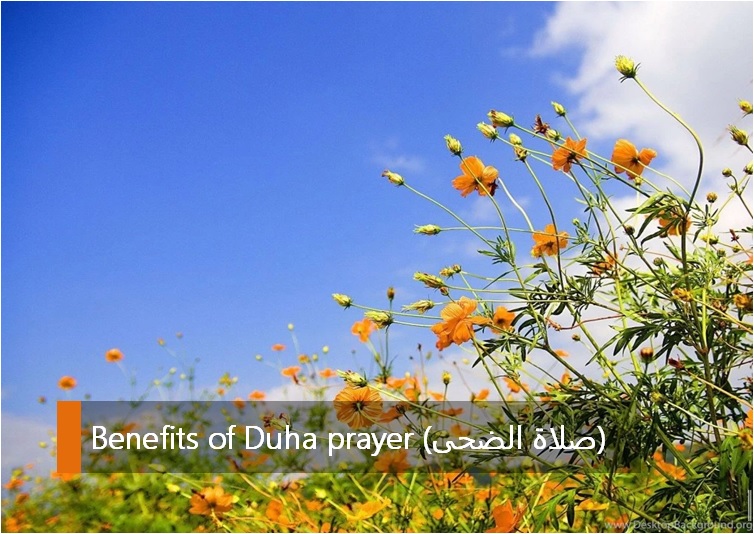
[Ishraq | Duha | Awwabeen | Tahajjud]
Duha is the forenoon (chasht) nafl prayer with at least 2 rak’ahs. Its time begins after the sun fully rises and it ends about few minutes before the Zuhr prayer.
1. Quran
والضحى
By the morning brightness. (93:1)
والشمس وضحاها
And (by) the sun and its forenoon radiance. (91:1)
قال موعدكم يوم الزينة وأن يحشر الناس ضحى
[Musa (عليه السلام)] said, “Your appointment is on the day of the festival when the people assemble at mid-morning.” (20:59)
أوأمن أهل القرى أن يأتيهم بأسنا ضحى وهم يلعبون
Or else did they feel secure against its coming in broad daylight while they played about (care-free)? (7:98)
وأنك لا تظمأ فيها ولا تضحى
And that you shall not be thirsty therein nor shall you feel the heat of the sun. (20:119)
2. Hadith
2.1 Abu Dharr (رضي الله عنه) reported: The Prophet (صلى الله عليه وآله وسلم) said,
يصبح على كل سلامى من أحدكم صدقة: فكل تسبيحة صدقة، وكل تهليلة صدقة، وكل تكبيرة صدقة، وأمر بالمعروف صدقة، ونهي عن المنكر صدقة، ويجزئ من ذلك ركعتان يركعهما من الضحى
“In the morning, charity is due on every joint bone of the body of everyone of you. Every utterance of Allah’s Glorification (i.e., saying Subhan Allah) is an act of charity, and every utterance of His Praise (i.e., saying Al-hamdu lillah) is an act of charity and every utterance of declaration of His Greatness (i.e., saying La ilaha illAllah) is an act of charity; and enjoining M’aruf (good) is an act of charity, and forbidding Munkar (evil) is an act of charity, and two Rak’ah Duha prayers which one performs in the forenoon is equal to all this (in reward).”
2.2 Abu Hurairah (رضي الله عنه) reported:
أوصاني خليلي صلى الله عليه وسلم بصيام ثلاثة أيام من كل شهر، وركعتي الضحى، وأن أوتر قبل أن أرقد
My Khalil [the Messenger of Allah (صلى الله عليه وآله وسلم)] directed me to fast three days of each month, and to observe two Rak’ah Duha (optional prayer) at forenoon, and to perform the Witr prayer before going to bed.
2.3 ‘Aishah (رضي الله عنها) reported:
كان رسول الله صلى الله عليه وسلم يصلي الضحى أربعًا ويزيد ما شاء الله
The Messenger of Allah (صلى الله عليه وآله وسلم) used to perform four Rak’ah of Duha prayer (at the forenoon) and would add to them whatever Allah wished.
2.4 Narrated ‘Aishah (رضي الله عنها):
دَخَلَ اَلنَّبِيُّ - صلى الله عليه وسلم -بَيْتِي, فَصَلَّى اَلضُّحَى ثَمَانِيَ رَكَعَاتٍ
Allah’s Messenger (ﷺ) entered my house and prayed eight Rak’at of Duha prayer.
2.5 Yahya related from Malik from Zayd ibn Aslam (رضی الله عنهم) that
عَنْ عَائِشَةَ، أَنَّهَا كَانَتْ تُصَلِّي الضُّحَى ثَمَانِيَ رَكَعَاتٍ ثُمَّ تَقُولُ لَوْ نُشِرَ لِي أَبَوَاىَ مَا تَرَكْتُهُنَّ
A’isha (رضی الله عنها) used to pray Duha with eight rakas, and she would say, “I would never stop doing them even if my parents were to be brought back to life.”
2.6 Abu Hurairah (رضي الله عنه) narrated that the Prophet (صلى الله عليه وآله وسلم) said:
لا يحافظ على صلاة الضحى إلا أواب، وهي صلاة الأوابين
“Only the repentant (Awab) preserves the forenoon prayer, and it is the prayer of those who repent (Salatul Awabeen).”
(At-Targhib wat-Tarhib 1/164)
2.7 It was narrated from Umm Hani’ bint Abu Talib (رضي الله عنها) that,
أَنَّ رَسُولَ اللَّهِ ـ صلى الله عليه وسلم ـ يَوْمَ الْفَتْحِ صَلَّى سُبْحَةَ الضُّحَى ثَمَانِيَ رَكَعَاتٍ سَلَّمَ مِنْ كُلِّ رَكْعَتَيْ
On the day of the Conquest (of Makkah) the Messenger of Allah (صلى الله عليه وآله وسلم) prayed voluntary Duha with eight Rak’ah, saying the Salam after each two Rak’ahs.
2.8 Jubair reported from Abu Ad-Darda, or Abu Dharr (رضی الله عنهم) that Allah’s Messenger (صلى الله عليه وآله وسلم) narrated that Allah (سبحانه و تعالى) Said:
ابْنَ آدَمَ ارْكَعْ لِي مِنْ أَوَّلِ النَّهَارِ أَرْبَعَ رَكَعَاتٍ أَكْفِكَ آخِرَهُ
“Son of Adam: Perform four Rak’ah for Me in the beginning of the day, it will suffice you for the latter part of it.”
2.9 Narrated Abu Buraydah (رضي الله عنه): I heard the Messenger of Allah (صلى الله عليه وآله وسلم) say:
فِي الإِنْسَانِ ثَلاَثُمِائَةٍ وَسِتُّونَ مَفْصِلاً فَعَلَيْهِ أَنْ يَتَصَدَّقَ عَنْ كُلِّ مَفْصِلٍ مِنْهُ بِصَدَقَةٍ ” . قَالُوا وَمَنْ يُطِيقُ ذَلِكَ يَا نَبِيَّ اللَّهِ قَالَ ” النُّخَاعَةُ فِي الْمَسْجِدِ تَدْفِنُهَا وَالشَّىْءُ تُنَحِّيهِ عَنِ الطَّرِيقِ فَإِنْ لَمْ تَجِدْ فَرَكْعَتَا الضُّحَى تُجْزِئُكَ
“A human being has 360 joints for each of which he must give alms. The people asked him: Who is capable of doing this ? He replied: It may be mucus in the mosque which you bury, and something which you remove from the road; but if you do not find such, two rak’ahs in the forenoon will be sufficient for you.”
2.10 ‘Abdullah ibn ‘Amr (رضي الله عنه) related:
“The Messenger of Allah (صلى الله عليه وآله وسلم) sent an expedition and they obtained lots of booty and returned quickly. The people talked about their quick victory, abundant booty, and quick return. At this the Messenger of Allah (صلى الله عليه وآله وسلم) said: ‘Shall I not guide you to a closer battle, a greater booty and a quicker return? Whoever makes wudu’ and then goes to the mosque to pray Duha, that is the closer battle, better booty, and quicker return.”‘
(Ahmad, At-Tabarani & Abu Ya’la)
2.11 Anas (رضي الله عنه) related:
“During a journey, I saw the Messenger of Allah (صلى الله عليه وآله وسلم) pray eight rak’at in the early day. When he finished, he said: ‘I prayed my prayer wishing and fearing. I asked my Lord for three things and He gave me two and withheld one. I asked Him not to put (all) my Ummah to trial by famine and He granted that request. And I asked that they would not be overtaken by their enemies (entirely) and He granted that request. And I asked that they not be split into groups and parties and He refused that request.”‘
(Ahmad, An-Nasa’i, Al-Hakim, Ibn Khuzaimah)
2.12 Zaid bin Arqam (رضي الله عنه) reported: I saw some people performing Duha (prayers) in the early forenoon and warned them (saying): These people must know that performing Salat a little later is better. The Messenger of Allah (صلى الله عليه وآله وسلم) said,
صلاة الأوابين حين ترمض الفصال
“The Salat of the penitent is to be observed when the young ones of camels feel the heat of the sun (i.e., when sand becomes hot).”
(Bulugh al-Maram 2/299, Riyad as-Salihin 1143)
2.13 Abu Hurairah (رضي الله عنه) narrated that Allah’s Messenger (صلى الله عليه وآله وسلم) said:
نْ حَافَظَ عَلَى شُفْعَةِ الضُّحَى غُفِرَ لَهُ ذُنُوبُهُ وَإِنْ كَانَتْ مِثْلَ زَبَدِ الْبَحْرِ
“Whoever continuously performs the two Rak’ah of Ad-Duha his sins will be forgiven, even if they be like the foam of the sea.”
2.14 It is narrated that Rasulullah (صلى الله عليه وآله وسلم) said,
“In the Heaven there is a door called Bab-ud-Duha and on the Day of Resurrection there will be a call, ‘Where is the person who preserved Salatul Duha? This is your place, enter with the grace of Allah’. “
(At-Tabrani)
2.15 Anas bin Malik (رضي الله عنه) narrated that Allah’s Messenger (صلى الله عليه وآله وسلم) said:
مَنْ صَلَّى الضُّحَى ثِنْتَىْ عَشْرَةَ رَكْعَةً بَنَى اللَّهُ لَهُ قَصْرًا مِنْ ذَهَبٍ فِي الْجَنَّةِ
“Whoever prays twelve Rak’ah of Ad-Duha, Allah will build a castle made of gold for him in Paradise.”
(Jami` at-Tirmidhi 473, Sunan Ibn Majah 1380, Mishkat al-Masabih 1316)
2.16 Abu ad-Darda’ (رضي الله عنه) narrated that the Messenger of Allah (صلى الله عليه وآله وسلم) said:
“Whoever prays Duha will not be written amongst the heedless (people), and whoever prays four (rakʿahs) will be written amongst the worshipers, and whoever prays six (rakʿahs), it will suffice him on that day, and whoever prays 8 (rakʿahs) will be written amongst the pious, and whoever prays 12 rakʿahs, Allah will build for him a palace in Paradise.”
(At-Targhib wat-Tarhib 1/320 & Sharh Thulathiyyat al-Musnad 2/306)
2.17 Narrated Abu Umamah (رضي الله عنه) that the Messenger of Allah (صلى الله عليه وآله وسلم) said:
“If anyone goes out from his house after performing ablution for saying the prescribed prayer in congregation (in the mosque), his reward will be like that of one who goes for hajj pilgrimage after wearing ihram (robe worn by the hajj pilgrims). And he who goes out to say the mid-morning (Duha) prayer, and takes the trouble for this purpose, will take the reward like that of a person who performs Umrah. And a prayer followed by a prayer with no worldly talk during the gap between them will be recorded in Illiyyun.”
(Sunan Abi Dawud 558, Mishkat al-Masabih 728)
3. Duas
The Duha prayer is often associated by many scholars with ease of sustenance and provisions. However, it entails far better rewards than that like worshiping/pleasing Allah, forgiveness, repentance and protection from heedlessness as indicated in the Ahadith. Here are some Duas that we can recite for Rizq:
اَللّهُمَّ اِنَّ الضُّحَاءَ ضُحَاءُكَ وَالْبَهَاءَ بَهَائُكَ وَالْجَمَالَ جَمَالُكَ وَالْقُوَّةَ قُوَّتُكَ وَالْقُدْرَةَ قُدْرَتُكَ وَالْعِصْمَةَ عِصْمَتُكَ اَللّهُمَّ اِنْ كَانَ رِزْقِى فِى السَّمَاءِ فَاَنْزِلْهُ وَاِنْ كَانَ فِى الْلأَرْضِ فَأَخْرِجْهُ وَاِنْ كَانَ بَعِيْدًا فَقَرِّبْهُ وَاِنْ كَانَ مُعَسِّرًا فَيَسِّرْهُ وَاِنْ كَانَ حَرَامًا فَطَهِّرْهُ بِحَقِّ ضُحَائِكَ وَبَهَائِكَ وَجَمَالِكَ وَقُوَّتِكَ وَقُدْرَتِكَ. اللهُمَّ اَتِنِى مَا اَتَيْتَ عِبَادَكَ الصَّالِحِيْنَ
O Allah! The brightness of the morning (Duha) is Your Brightness, and the radiance is Your Radiance, and the beauty is Your Beauty, and the might is Your Might, and the power is Your Power, and the protection is Your Protection. O Allah. If my sustenance is in the Heaven, then send it down to me, and if it is in the earth, then extract it for me, and if it is far away, then bring it closer to me, and if it is filled with challenges, then ease it for me, and if it (the means) is forbidden, then purify it for me. By Your Brightness, Radiance, Beauty, Might and Power, O Allah, grant me of what You granted Your righteous servants.
اللَّهُمَّ اكْفِنِي بِحَلَالِكَ عَنْ حَرَامِكَ، وَأَغْنِنِي بِفَضْلِكَ عَمَّنْ سِوَاكَ
O Allah! Grant me enough of what You make lawful so that I may dispense with what You make unlawful, and enable me by Your Grace to dispense with all but You.
اللَّهُمَّ إِنِّي أَسْأَلُكَ الْهُدَى، وَالتُّقَى، وَالْعَفَافَ، وَالْغِنَى
O Allah! I beseech You for guidance, piety, chastity and contentment.
اللَّهُمَّ اغْفِرْلِي، وَارْحَمْنِي، وَعَافِنِي، وَارْزُقْنِي
O Allah! Forgive me, have mercy on me, protect me and provide me with sustenance.
اللَّهُمَّ إِنِّي أَسْأَلُكَ مُوجِبَاتِ رَحْمَتِكَ، وَعَزَائِمَ مَغْفِرَتِكَ، وَالسَّلَامَةَ مِنْ كُلِّ إِثْمٍ، وَالْغَنِيمَةَ مِنْ كُلِّ بِرٍّ، وَالْفَوْزَ بالْجَنَّةِ، وَالنَّجَاةَ مِنَ النَّارِ
O Allah! I beg You for that which incites Your Mercy and the means of Your forgiveness, safety from every sin, the benefit from every good deed, success in attaining Jannah and deliverance from Fire.
اللَّهُمَّ إِنِّي أَسْأَلُكَ عِلْمًا نَافِعًا وَرِزْقًا طَيِّبًا وَعَمَلاً مُتَقَبَّلاً
O Allah, I ask You for beneficial knowledge, goodly provision and acceptable deeds.
4. ’Ulama
4.1 Shaykh Ibn Baaz (رحمه الله) said:
“The minimum – for Duha – is two rak‘ahs, and there is no maximum number. But the Prophet (صلى الله عليه وآله وسلم) prayed two and four rak‘ahs, and on the day of the conquest of Makkah he prayed Duha with eight rak‘ahs, on the day on which Allah granted him the conquest of Makkah. So this matter is broad in scope. Whether a person prays eight or ten or twelve rak‘ahs, or more than that, or less, there is nothing wrong with it, because the Prophet (صلى الله عليه وآله وسلم) said: “The (Sunnah) prayers of the night and day are two (rak‘ahs) by two.” The Sunnah is to pray two by two, saying the salaam after each two rak‘ahs.”
(Majmoo‘ Fataawa Ibn Baaz, 11/389)
5. See also

3 thoughts on “Benefits and Virtues of Duha prayer”